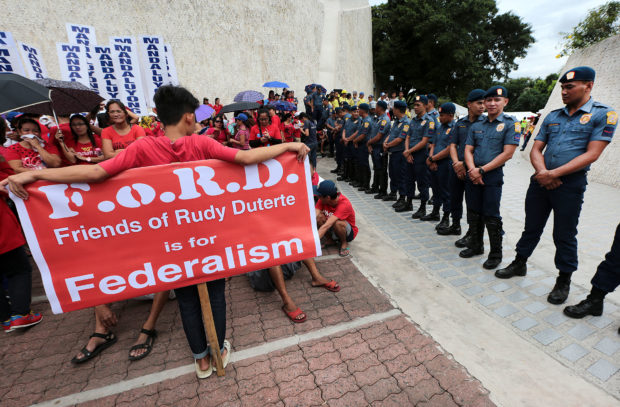
PROFEDERALISM Supporters of President Duterte declare their stand for a federal form of government during a rally at the People Power Monument in Quezon City in February.
—GRIG C. MONTEGRANDE
Despite President Duterte’s strong push for federalism, only one in four Filipino adults are aware of federalism, according to the latest survey of the Social Weather Stations (SWS).
The survey found that only 25 percent of the 1,200 respondents polled nationwide were aware of federalism, while 75 percent became acquainted with it only during the survey period of March 23-27.
Thirty-seven percent supported the federal system of government, 29 percent disagreed, and 34 percent were undecided.
The garnered percentages resulted in a net agreement score of +7 (agree minus disagree), which the SWS classified as “neutral.”
The survey had a margin of error of plus or minus 3 percentage points for national percentages. While only 25 percent were aware of federalism, the base used for the question on agreement or disagreement was the total number of respondents.
‘Higher awareness’
SWS recorded higher awareness and support for federalism in Mindanao, among Muslims and college graduates.
It found stronger support among those with much trust in President Duterte and those satisfied with his work and the performance of his administration as a whole.
The Duterte administration is pushing for a shift from the current unitary to a federal system of government.
A consultative committee formed by the President to study amendments to the Constitution began its review in February.
The committee aims to present its report to the President in July, ahead of his annual State of the Nation Address.
The SWS survey results echoed findings of another poll done by Pulse Asia, also in March, which found that seven out of 10 Filipinos (71 percent) admitted to having little, almost none, or no knowledge at all of the proposed federal system.
A majority of Pulse Asia respondents (66 percent) were not in favor of a shift to a federal system.
Mindanao support
SWS found awareness of the proposed shift to a federal system was highest in Mindanao (37 percent), followed by Metro Manila (28 percent), Visayas (22 percent) and Balance Luzon (20 percent).
Using educational attainment as a yardstick, it showed that awareness registered 53 percent among college graduates, 26 percent among high school graduates, 17 percent among elementary dropouts, and 16 percent among elementary graduates.
Awareness among Muslims was at 51 percent, Iglesia ni Cristo members at 37 percent, other Christian groups at 32 percent, and Catholics at 22 percent.
Agreement with federalism was also highest in Mindanao with a “very strong” net agreement score of +43. Muslims favoring federalism had a “very strong” net agreement score of +47.
Support for the federal system was highest among college graduates at a moderately strong +27.
Insufficient info drive
“We’ll need to work harder,” presidential spokesperson Harry Roque said in a press briefing.
Roque said the information drive for federalism was not enough though the President had been advocating for the shift to federalism since taking office in 2016.
He said the lack of awareness was expected as the consultative committee was still working on the draft charter.
‘Uphill battle’
Sen. Aquilino Pimentel III, for his part, said that getting people interested in the idea was an uphill battle for now.
He attributed this to the absence of a specific federalism model to be discussed.
Pimentel, a federalism advocate, noted that the consultative committee was still finalizing its recommendations, although it had already adopted a federal-presidential form of government similar to that of the United States.
With a particular model to push, it would be easier to discuss the idea of federalism with the people as the concept would no longer be abstract, Pimentel said.
But Sen. Francis Escudero noted that Mr. Duterte’s interest in federalism was already waning. — WITH REPORTS FROM LEILA B. SALAVERRIA, SAMANTHA WESTFALL AND DONA Z. PAZZIBUGAN